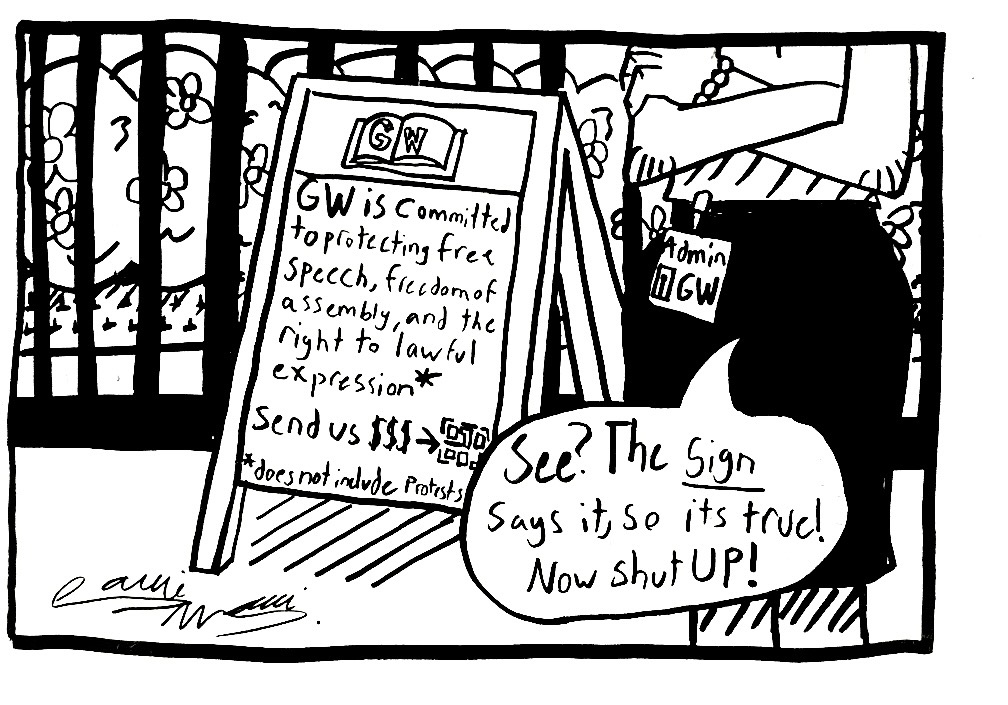Last week, GW announced that it will not rescind the honorary degree it awarded comedian Bill Cosby in 1997. That was the wrong decision.
The University gives honorary degrees to people who “demonstrate the value of hard work, dignity and integrity.” Over the past year, more than 40 women have accused Cosby of drugging and raping them. And in a deposition that was released this past summer, Cosby admitted to giving women quaaludes, and suggested that he had been able to pick up on nonverbal clues that signaled consent. Clearly, Cosby no longer demonstrates dignity or integrity, and is no longer worthy of an honorary degree from GW.
What Cosby did is an affront not only to women, but in some ways to students and activists on college campuses. For the last few years, student activists across the country, including here at GW, have focused their attention on sexual assault prevention. That’s probably why seven schools have rescinded Cosby’s honorary degrees: because what he did is the antithesis of everything against which students have been fighting.
That’s also why it’s so concerning that GW felt the need to proclaim it wouldn’t be taking back Cosby’s degree. Surprisingly, the University is still OK with its name being attached to an alleged serial rapist – and that just doesn’t make sense.
“While we are shocked and disturbed by the allegations against Mr. Cosby, honorary degrees are conferred at a moment in time, based on what the University knows about the honoree at that time,” the statement reads. “It has never been the University’s practice to rescind an honorary degree.”
Over the past two years, GW has been supportive of its students’ efforts to combat sexual assault. The University strengthened its sexual assault policy in 2013 to allow survivors more reporting time and conducted a campus climate survey last year, and, in the spring, University President Steven Knapp committed to in-person prevention trainings for incoming freshmen, which about 97 percent of the Class of 2019 has completed.
Though Cosby’s honorary degree serves no practical purpose, keeping it intact runs contrary to the University’s commitment to prevent sexual assault on campus. And the fact that it has “never been the University’s practice to rescind an honorary degree” is a poor excuse for violating that commitment. There’s a first time for everything.
Sure, revoking the degree is completely symbolic. An honorary degree is nothing like an earned degree, and taking it away would have no effect on Cosby. But just because something is symbolic doesn’t mean it isn’t worth doing. Rescinding the degree would make a statement, and would put to rest anyone’s suggestions that GW is ignoring Cosby’s actions.
By attempting to justify its verdict, the University has drawn unnecessary negative attention to itself, something that officials try to limit. The University didn’t have to come down with a verdict on Cosby’s honorary degree right away, and at the very least, officials could have waited a bit longer to make this decision. But because they chose not to keep quiet, GW is likely to be cited as one of the first schools to publicly defend its decision to keep Cosby’s honorary degree.
Because many schools, including GW, awarded Cosby his degrees before becoming aware of his numerous assaults on women, it makes sense that schools are changing their minds in light of new information. Taking away an honorary degree doesn’t take away past achievements from a disgraced star. However, it shows Cosby, and the population at large, that his character no longer aligns with the values of a university.
It’s understandable that some people are concerned about the precedent that revoking a degree may set. It would certainly open the University up to more scrutiny of its past and future honorees. But it’s unlikely that students will go back to criticize every honorary degree GW has given out in the past. Cosby is an exceptional case: He allegedly sexually assaulted many women, which hits close to home, and we have every right to care about that.
Releasing such a strong statement about keeping Cosby’s honorary degree just looks bad. There’s no reason to avoid cutting ties with an alleged serial rapist, and GW should have known better.
The editorial board is composed of Hatchet staff members and operates separately from the newsroom. This week’s piece was written by opinions editor Sarah Blugis and contributing opinions editor Melissa Holzberg, based on discussions with managing director Rachel Smilan-Goldstein, sports editor Nora Princiotti, senior design assistant Samantha LaFrance, copy editor Brandon Lee and assistant sports editor Mark Eisenhauer.
Want to respond to this piece? Submit a letter to the editor.




